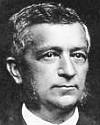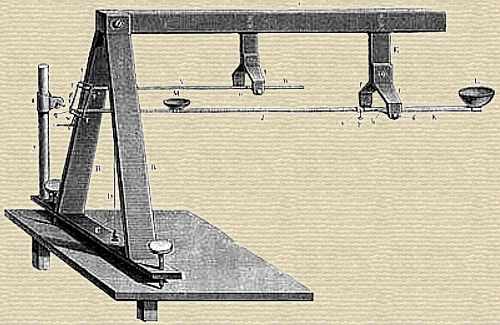Today in Science History - Quickie Quiz
 (source)
(source)
|
Karl von Vierordt
(1 Jul 1818 - 22 Nov 1884)
German physician who devised the the sphygmograph, the first instrument to make a tracing of a human pulse from measurement of blood pressure by a non-invasive method.
|
Sphygmograph
by Karl von Vierordt

Karl Vierord's Sphygmograph (1855)
Whereas earlier methods of measuring blood pressure had involved inserting a tube into an artery, the sphygmograph invented by Karl von Vierordt, in 1854, enabled the tracing of a human pulse by a non-invasive technique. He originated the important principle that blood pressure could be determined by measurement of the counter pressure that would suppress the pulse. This was obtained using a mechanical balance and weights. Although still rather crude and cumbersome to operate, it was nevertheless an improvement in accuracy over earlier techniques.
From: Karl von Vierordt,
Die Lehre vom Arterienpuls in Gesunden und Kranken Zustanden (1855), 22.
(source)See also:
- 1 Jul - short biography, births, deaths and events on date of Vierordt's birth.
Nature bears long with those who wrong her. She is patient under abuse. But when abuse has gone too far, when the time of reckoning finally comes, she is equally slow to be appeased and to turn away her wrath. (1882) --
Nathaniel Egleston, who was writing then about deforestation, but speaks equally well about the danger of climate change today.
 Carl Sagan
Carl Sagan: In science it often happens that scientists say, 'You know that's a really good argument; my position is mistaken,' and then they would actually change their minds and you never hear that old view from them again. They really do it. It doesn't happen as often as it should, because scientists are human and change is sometimes painful. But it happens every day. I cannot recall the last time something like that happened in politics or religion. (1987) ...
(more by Sagan) Albert Einstein: I used to wonder how it comes about that the electron is negative. Negative-positive—these are perfectly symmetric in physics. There is no reason whatever to prefer one to the other. Then why is the electron negative? I thought about this for a long time and at last all I could think was “It won the fight!” ...
(more by Einstein) Richard Feynman: It is the facts that matter, not the proofs. Physics can progress without the proofs, but we can't go on without the facts ... if the facts are right, then the proofs are a matter of playing around with the algebra correctly. ...
(more by Feynman)
 (source)
(source)





